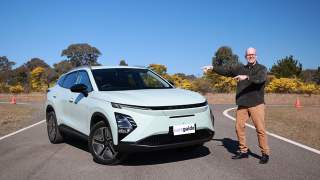
Why autonomous cars are still a while off

Imagine you're facing an imminent crash and have to decide between hitting a truck head-on or running over a pedestrian.
Which way would you go? It's an impossible choice, but imagine it was out of your hands. That's the nightmare scenario of autonomous driving, when you give control of your car to a collective of on-board computers.
It's one of the reasons — beyond the inevitable legal battles following a crash — that self-driving cars are not going to be a viable motoring choice for some time.
They might be fine on highways dedicated to road trains of autonomous cars, where the driver and passengers can get on with more important things such as iPads and email, but no-one knows yet how they will drive in the real world.
BMW admits it has yet to answer the tough questions on crashes
BMW is one of the world leaders on self-driving cars and I rode in an autonomous 7 Series last year that's one of the best in the business, provided you stick to the 10km of German road it knows better than I know my computer keyboard.
Introduce a crash scenario and things get woolly. Very woolly.
Even BMW admits it has yet to answer the tough questions on crashes.
"Hit a truck or a pedestrian? That decision cannot be taken by a machine," says Ian Robertson, the global head of marketing at BMW and one of the men who will soon be selling us into self-driving cars, told me at the Detroit auto show. "I'm not sure we, as an industry or a society, are wanting machines to make those decisions."
Do I see full autonomous driving in the near future? No
Robertson believes autonomous driving will be a stepped transition, as driver-assistance technologies show a clear benefit — as ESP stability control and blind-spot warnings do today — beyond auto braking for hazards.
"Do I see full autonomous driving in the near future? No," says Robertson. "The questions that need to be answered are not easy ones."










Comments